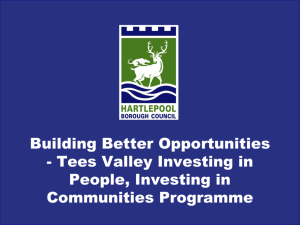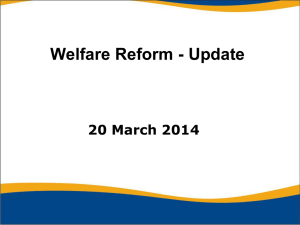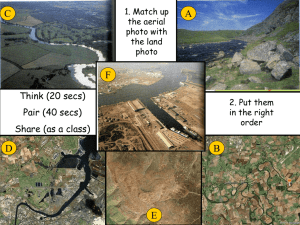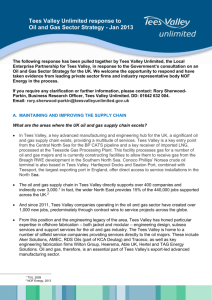Draft Feasibility Study Brief for Tees Valley September 2014 To
advertisement
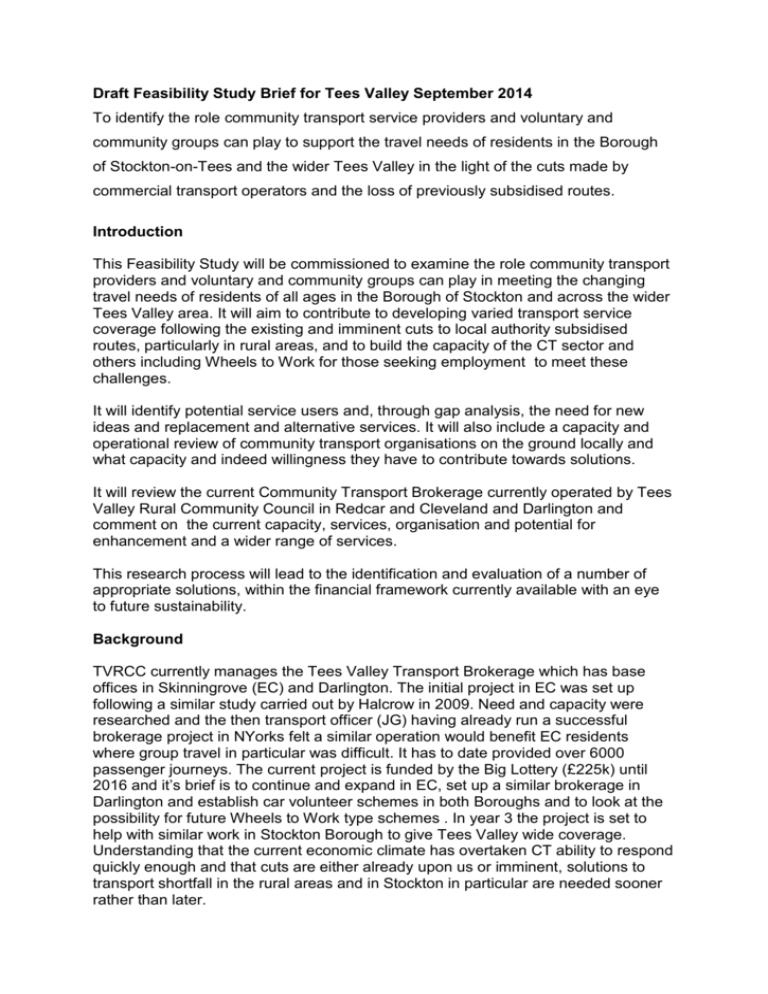
Draft Feasibility Study Brief for Tees Valley September 2014 To identify the role community transport service providers and voluntary and community groups can play to support the travel needs of residents in the Borough of Stockton-on-Tees and the wider Tees Valley in the light of the cuts made by commercial transport operators and the loss of previously subsidised routes. Introduction This Feasibility Study will be commissioned to examine the role community transport providers and voluntary and community groups can play in meeting the changing travel needs of residents of all ages in the Borough of Stockton and across the wider Tees Valley area. It will aim to contribute to developing varied transport service coverage following the existing and imminent cuts to local authority subsidised routes, particularly in rural areas, and to build the capacity of the CT sector and others including Wheels to Work for those seeking employment to meet these challenges. It will identify potential service users and, through gap analysis, the need for new ideas and replacement and alternative services. It will also include a capacity and operational review of community transport organisations on the ground locally and what capacity and indeed willingness they have to contribute towards solutions. It will review the current Community Transport Brokerage currently operated by Tees Valley Rural Community Council in Redcar and Cleveland and Darlington and comment on the current capacity, services, organisation and potential for enhancement and a wider range of services. This research process will lead to the identification and evaluation of a number of appropriate solutions, within the financial framework currently available with an eye to future sustainability. Background TVRCC currently manages the Tees Valley Transport Brokerage which has base offices in Skinningrove (EC) and Darlington. The initial project in EC was set up following a similar study carried out by Halcrow in 2009. Need and capacity were researched and the then transport officer (JG) having already run a successful brokerage project in NYorks felt a similar operation would benefit EC residents where group travel in particular was difficult. It has to date provided over 6000 passenger journeys. The current project is funded by the Big Lottery (£225k) until 2016 and it’s brief is to continue and expand in EC, set up a similar brokerage in Darlington and establish car volunteer schemes in both Boroughs and to look at the possibility for future Wheels to Work type schemes . In year 3 the project is set to help with similar work in Stockton Borough to give Tees Valley wide coverage. Understanding that the current economic climate has overtaken CT ability to respond quickly enough and that cuts are either already upon us or imminent, solutions to transport shortfall in the rural areas and in Stockton in particular are needed sooner rather than later. Throughout the Tees Valley rural routes and timetables have been decimated. The capacity within CT locally is almost entirely taken up with to school transport and the moving of elderly and infirm residents to and from various day care facilities. There is not the capacity there to make any significant inroads into everyday transport provision or to replace services which have been cut or removed. TVRCC Brokerage serving East Cleveland offers, for the main, group travel for varying groups within the communities and has some experience of operating a scheduled service from the village of Skinningrove however; this was for a limited period and stretched capacity, particularly volunteer drivers to the limit. Providing travel for shopping, social outings, sports training, evening classes etc. all help combat social and rural isolation, especially for the elderly but are not a solution to public transport shortages. These gaps can only successfully be bridged by all parties participating to provide services. Everywhere surveyed bemoans a lack of evening and weekend services and again these are not easily facilitated using unpaid drivers even if vehicles were available. The research information will need to point to achieving the best ongoing transport solutions within a very tight and finite budget and should inform residents how any available future funding can best fill the gaps in provision to maximum public benefit. TVRCC is also finding that whilst rural areas bear the brunt of cuts there is also a problem with travel in the opposite direction with rural businesses finding difficulty recruiting due to no outgoing transport for prospective employees without a car perhaps pointing to necessitate a Wheels to Work scheme for those seeking employment without adequate transport. The Brief The feasibility study should build on recent research undertaken by the local authority, TVRCC ,Tees Valley Unlimited and others, with the aim of identifying the most appropriate transport measures required to take forward the development of community based transport services to meet as many resident’s travel needs as possible within the restraints posed by finance and available capacity (some of which could be enhanced or increased using some of the fund available) . It is imperative that the preferred consultant works closely with all the local stake holders to support their current work in this field. The Feasibility Study Content A RESEARCH Stage 1: Identify potential service users and their needs Potential service users should be identified together with a brief synopsis of their individual needs. Potential service users should include: Elderly Children & Young People Rural residents Mobility impaired Residents seeking employment (W2W) Focus groups should be undertaken in order to assess the level of patronage expected, the type of services required etc. Consultants in their response should demonstrate how they propose to obtain a robust assessment of need. The output of Stage 1 should be a robust evidence base detailing the needs and issues affecting residents and potential service users. For children and young persons, whilst there is clearly a need for transport to school, this should be taken as a given and not as a service to be run solely by LA’s buying in the service from community transport as this depletes CT to where there is no capacity left to run community transport, in effect CT organisations have become school bus companies with little or no capacity to do anything else. Residents with mobility difficulties whilst to some extent are able to access day care facilities via some services, have little or no flexibility or choice. Accessible taxi provision is extremely limited Tees Valley wide and despite funding being available for a vehicle in Darlington Borough, no provider is prepared to operate a service as required. Rural residents, though limited in number spread across several areas, are vociferous in their demands particularly for evening and weekend services with older rural dwellers unable to shop, attend appointments etc. A thorough needs assessment would perhaps point to a “joining up” of several areas by a single service. Again much of the capacity is taken up on regular contracts and currently cannot facilitate much of what is required. Stage 2: Gap Analysis Identify gaps in commercial transport service provision, including routes recently cut from the transport network by withdrawal of subsidised routes. A mapping exercise should be undertaken to highlight gaps in provision across the area with particular emphasis on access to work, education, medical and other essential services. Gaps in evening and weekend services are a very strong complaint for many residents restricting social interaction and leading to isolation. The feasibility of a wheels to work scheme should be examined to provide the possibility of providing transport to job opportunities particularly for younger residents who find it impossible to get to work places for shift work involving early or late start/finishing. Stage 3: Assessment of current CT service provision the role of the transport brokerage in the Tees Valley and the capacity needs of the sector An assessment of CT service provision should be undertaken. CT provision should be mapped and a full audit of capacity undertaken to include also unconventional means such as wheels to work. This should include an audit of what is actually available for community use rather than the actual vehicle count. There is CT capacity across the area but it is as previously stated, mostly taken up with to school and day care centre transport and is not available for community transport per se. The mapping exercise should point to organisations in the area who own vehicles which may have spare time capacity not currently being fully utilised. An assessment of the willingness to make vehicles available and to contribute to solutions by CT locally is essential as to date the sector is disparate and on the whole “not joined up”. Stage 4: Stakeholder Consultation Consultation should be undertaken with all stakeholders in order to identify aspirations and concerns for developing transport services within the Tees Valley. Consultation should be undertaken with local authorities, councillors, voluntary and community sector groups, parish councils and village halls among others, to identify need and potential for partnership working. Particular focus must be placed on the proposed local authority process of making funding available to groups for local community-led transport initiatives. In accessing funding, stakeholders should be encouraged to look at sharing any resource gained (particularly vehicles). There are numerous small organisations and groups who have a minibus funded and it is then solely used by that organisation which only uses it occasionally leading to a wasted resource which if more fully utilised, would increase available capacity for all. Successful brokerage models can bring together available capacity to provide services and the survey should identify where the local capacity is and bring all stakeholders together (providers, vehicle owners, prospective service users, resident focus groups to look for community led solutions.) Stage 5: Funding and Communities An assessment of available and potential funding opportunities should take place. An assessment of TVRCC’s contribution through the Tees Valley Transport Brokerage and further BIG Lottery potential funding should be included. TVU have also expressed an interest in wheels to work schemes to assist with employment access. Funding should be aimed squarely at service provision which will benefit the majority and address the most pressing needs which are identified from the needs assessment. The research should point to best possible options for utilising any funding gained with a distinct lean towards a sharing of any available resources to benefit as wide a cross section of the community as possible. The aim being to use any future funding to improve community links and access to services and opportunities, NOT to increase CT capacity to tender for contracts which then take up all that capacity. B SOLUTIONS and WAY FORWARD Stage 6: Identification and evaluation of solutions Consultants should draw on their expertise to identify a range of solutions to address the issues and challenges identified in Stages 1-5. A full SWOT analysis should be undertaken per option, including identification of any barriers to delivery and appropriate strategies to overcome them. Consultants will be expected to take into consideration all forms of unconventional transport and draw on examples of best practice from other areas which have suffered from withdrawal of public transport services. A key element of potential solutions should be sustainability. Sustainability will only be achieved by maximum utilisation of available capacity and by a willingness by all parties to share resources and expertise. Stage 7: Development of preferred solutions A summary should be provided of the likely operational costs associated with all the preferred options and appropriate local contracting and other funding opportunities. It should draw on the needs assessment, the mapping of local capacity and best possible use of resources to identify how any future funding can be allocated to have maximum impact on improving transport options for the maximum number of residents over the whole Tees Valley. OUTPUTS A written feasibility report covering Stages 1-7 should be presented to TVRCC and partners on completion of the study. TIMESCALE The feasibility study should be completed within 3 months of the commencement of the commission. BUDGET Consultants should be aware that the budget for this study is in the region of £10,000. To Apply Interested consultants should provide:An expression of interest outlining their experience and expertise in the field Information about other projects of this kind they have undertaken in the past. An outline of how they will structure their approach to this work A projected time table. 2 referees Please apply by..contacts as follows Email – smetcalf@teesvalleyrcc.org.uk Post: S Metcalf Unit 2A, Cadcam Centre, High Force Rd, Riverside Park. Middlesbrough TS21RH Further information from Stephen Metcalf - 07949049822 Please provide applications by.Thursday 9th October 2014 Interviews/selection will be held by Friday 17th October 2014.


